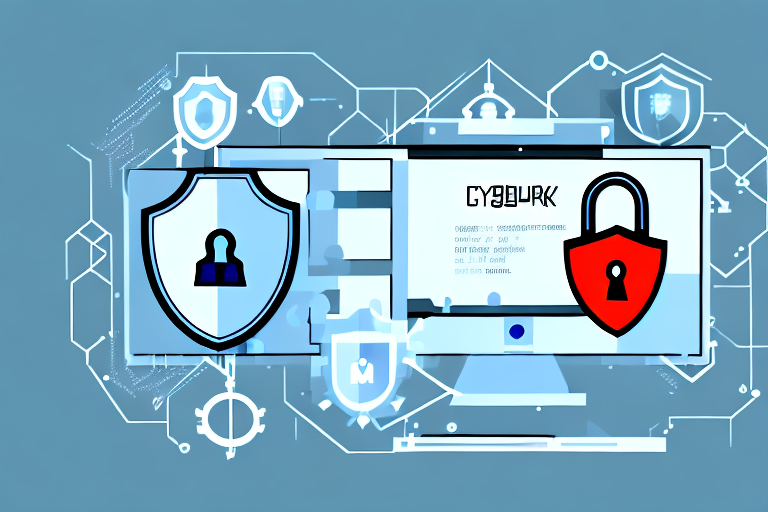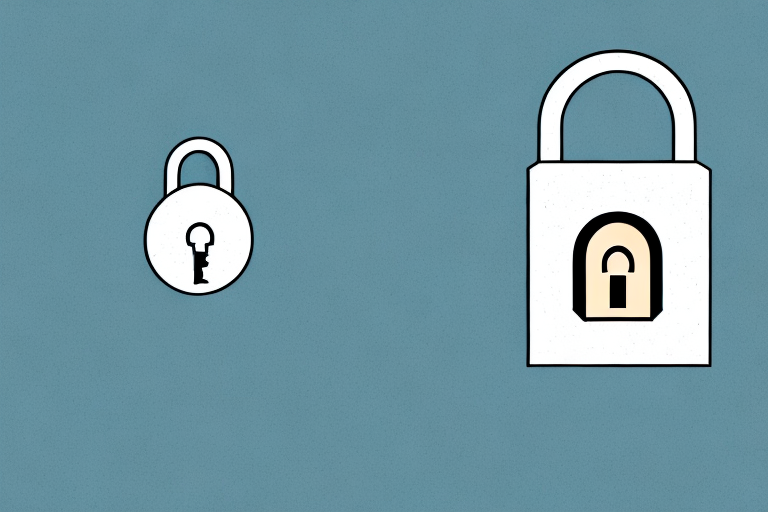Why Website Security is Critical for Your Business
Recent studies have shown that over 60% of small and medium-sized businesses have experienced a [cybersecurity breach](https://www.csoonline.com/article/3315215/what-is-cybersecurity.html). The costs of such breaches can be significant, including lost revenue, legal fees, and damage to your brand's reputation. Maintaining a secure website is essential for protecting your business from these harms.
One of the most common ways that hackers gain access to websites is through outdated software and plugins. Regularly updating your website's software and plugins is essential to patch any vulnerabilities. Additionally, implementing strong passwords and [two-factor authentication](https://www.cisa.gov/two-factor-authentication) can add an extra layer of security to your website.
Another important aspect of website security is protecting your customers' personal and financial information. If your website collects any sensitive information, such as credit card numbers or addresses, it is crucial to use encryption and secure storage methods to prevent this information from being accessed by unauthorized parties. Failure to do so can result in legal consequences and loss of customer trust.
Common Types of Website Security Threats and Attacks
There are numerous ways that hackers can target your site, ranging from brute force attacks and SQL injections to cross-site scripting and session hijacking. Understanding these threats and their potential impact on your site is the first step in preventing them. You can reduce the risk of these attacks by:
- Implementing strong password management policies
- Employing secure authentication methods
- Using [SSL Certificates](https://www.cloudflare.com/learning/ssl/what-is-an-ssl-certificate/) to encrypt user data
One of the most common website security threats is phishing. This is when hackers create fake websites or emails that appear to be from a legitimate source, such as a bank or social media platform, in order to trick users into giving away their personal information. To prevent this, it's important to educate your users on how to identify and avoid phishing attempts.
Another growing threat is ransomware, which is a type of malware that encrypts a user's files and demands payment in exchange for the decryption key. To protect against ransomware, it's important to regularly back up your website and keep your software up to date with the latest security patches.
The Cost of a Cybersecurity Breach and How to Avoid It
Cybersecurity breaches can cost you not only money but also the trust of your customers. Businesses must understand the risks associated with cybersecurity breaches and take steps to protect sensitive data. To avoid incidents of cybersecurity breaches, you can:
- Monitor your website's logs
- Regularly update your software and plugins
- Use [web application firewalls (WAFs)](https://www.cloudflare.com/learning/security/web-application-firewall-waf/)
It is important to note that cybersecurity breaches can also result in legal consequences for businesses. Depending on the severity of the breach and the type of data that was compromised, businesses may face lawsuits, fines, and even criminal charges. Therefore, it is crucial for businesses to not only prioritize cybersecurity measures but also have a plan in place for how to respond in the event of a breach. This includes having a designated team to handle the situation, notifying affected parties, and cooperating with law enforcement and regulatory agencies.
Understanding SSL Certificates and HTTPS Protocol
[SSL certificates](https://www.ssl.com/faqs/what-is-an-ssl-certificate/) are an essential part of website security. They ensure that user data is encrypted and protected, which helps keep your customers' private information safe. By implementing SSL certificates and the [HTTPS protocol](https://developer.mozilla.org/en-US/docs/Web/HTTP/Overview), your website can establish trust and credibility with your users and avoid potential vulnerabilities associated with unsecured connections.
One of the main benefits of using SSL certificates and the HTTPS protocol is that they can improve your website's search engine ranking. [Google has stated](https://developers.google.com/search/blog/2014/08/https-as-ranking-signal) that secure websites are given priority in search results, which means that implementing SSL certificates can help your website rank higher and attract more traffic.
Another advantage of using SSL certificates is that they can help prevent phishing attacks. Phishing is a type of cyber attack where hackers try to trick users into giving away their personal information by posing as a legitimate website. By using SSL certificates, you can ensure that your website is authentic and that users can trust it, which can help prevent phishing attacks and protect your users' sensitive data.
Best Practices for Password Management and Access Control
Passwords are the gateway to your sensitive data, and managing them effectively is critical for maintaining website security. Implementing robust password policies such as:
- Requiring complex passwords
- Enabling two-factor authentication
- Avoiding password reuse
can improve the security of your website and reduce the risk of a cybersecurity breach.
Another important aspect of password management is regularly updating passwords. It is recommended to change passwords every 90 days to ensure that they remain secure. Additionally, it is important to educate users on the importance of password security and provide training on how to create strong passwords and avoid common mistakes such as using personal information or common words.
Access control is also a crucial component of website security. Limiting access to sensitive data and functions to only authorized personnel can prevent unauthorized access and reduce the risk of data breaches. Implementing [role-based access control](https://www.csoonline.com/article/3243800/role-based-access-control-rbac-definition-example.html), where users are granted access based on their job responsibilities, can also help to ensure that users only have access to the data and functions that are necessary for their job.
How to Implement Secure Authentication Methods
Authentication methods are used to control access to your website and protect sensitive information, and choosing the right authentication method is essential to maintain website security. You can use methods such as:
- [Biometric authentication](https://www.nist.gov/programs-projects/biometric-authentication)
- Key fobs
- Digital certificates
to ensure one's identity and prevent unauthorized access to your site.
It is important to keep in mind that no authentication method is foolproof, and it is recommended to use a combination of methods to increase security. Additionally, regularly updating passwords and implementing [multi-factor authentication (MFA)](https://www.cisa.gov/multi-factor-authentication) can further enhance website security and protect against potential breaches.
Tips for Regularly Updating Your Website's Software and Plugins
Outdated software and plugins can be an easy target for cybercriminals. Regularly updating your software and plugins is essential to prevent vulnerabilities that attackers can exploit. You can choose to:
- Automate your updates
- Manually update your software and plugins
depending on your preference.
Automating your software and plugin updates can save you time and effort. Many content management systems (CMS) have built-in tools that allow you to schedule automatic updates. This ensures that your website is always running on the latest version of the software and plugins, reducing the risk of security breaches.
However, if you prefer to manually update your software and plugins, it is important to set a regular schedule to check for updates. This can be done weekly or monthly, depending on the frequency of updates for your specific software and plugins. Make sure to also backup your website before updating, in case any issues arise during the process.
The Importance of Monitoring Your Website's Activity Logs
Monitoring your website's activity logs can allow you to detect any unusual traffic patterns or suspicious activity in your site, which can be useful in preventing cybersecurity breaches and attacks. You can set up alerts and notifications for any suspicious activity in your site. Tools such as [Splunk](https://www.splunk.com/), [Loggly](https://loggly.com/), and [ELK Stack](https://www.elastic.co/what-is/elk-stack) can help you efficiently monitor and analyze your activity logs.
Benefits of Using Web Application Firewalls (WAFs)
[Web application firewalls (WAFs)](https://www.cloudflare.com/learning/security/web-application-firewall-waf/) are specialized tools that can protect your website from various threats such as SQL injections, cross-site scripting, and brute force attacks. They can block any suspicious requests that could compromise your website's security. Implementing a WAF can help ensure your website's data and your user's sensitive information are kept safe.
Moreover, WAFs can also help improve your website's performance by reducing the amount of malicious traffic that your server has to handle. This can lead to faster load times and a better user experience. Additionally, WAFs can provide valuable insights into your website's traffic and security threats, allowing you to make informed decisions about how to further improve your website's security measures.
Essential Tools for Website Security Testing and Scanning
Performing regular security testing and scanning can identify any vulnerabilities in your website, which can be patched before a cyber-attack. There are various tools available such as vulnerability scanners, penetration testing tools, and code analysis tools that can help you test and scan your website for potential security risks.
Some of the most popular tools include:
- [Nessus](https://www.tenable.com/products/nessus), which can scan for over 100,000 known vulnerabilities and can be customized to fit your specific needs.
- [Metasploit](https://www.metasploit.com/), a penetration testing tool that can simulate attacks on your website to identify any weaknesses in your security measures.
- [SonarQube](https://www.sonarqube.org/), a code analysis tool that can scan your website's source code for any potential security risks.
These tools can identify issues such as SQL injection vulnerabilities, cross-site scripting (XSS) vulnerabilities, and insecure authentication methods.
How to Respond to a Security Breach or Attack
Despite your best efforts, cybersecurity breaches can still occur. Knowing how to respond to these incidents and mitigate the damage can help you recover quickly and protect your reputation. To effectively respond to a security breach, you should:
- Have a backup plan such as disaster recovery
- Communicate with your stakeholders
- Improve your security protocols
Responding promptly can reduce the damage caused by such breaches. This includes having a designated team to handle the situation, notifying affected parties, and cooperating with law enforcement and regulatory agencies.
Advanced Techniques for Protecting Your Site Against Malware and Viruses
Malware and viruses can cause significant damage to your site and compromise your user's sensitive data. Advanced techniques such as:
- Sandboxing
- Virtualization
- Anomaly detection
can prevent these threats from penetrating your website. It is essential to understand the importance of these techniques and the role they play in protecting your website against threats.
The Future of Website Security: Trends to Watch Out For
The field of cybersecurity is rapidly evolving, and it's essential to keep up with the latest trends and changes. Technologies such as [Machine Learning](https://www.cisco.com/c/en/us/solutions/collateral/executive-perspectives/annual-cybersecurity-report/acr-2019/2019-annual-cybersecurity-report.pdf), [Artificial Intelligence](https://www.forbes.com/sites/forbestechcouncil/2023/08/03/using-artificial-intelligence-to-enhance-cybersecurity/?sh=3b591c4a106d), and [Blockchain](https://www.ibm.com/blockchain/what-is-blockchain) technology are emerging as some of the ways to secure websites. By keeping up with the latest trends, you can prepare for potential threats and enhance your website's security.
Best Practices for Educating Employees on Cybersecurity Awareness
While the technical aspects of website security are crucial, employee education and awareness are equally important. Employees must understand the importance of security protocols, such as:
- Avoiding suspicious links
- Choosing strong passwords
- Recognizing phishing emails
Regular training and awareness programs can help in creating a culture of security awareness within your organization.
In conclusion, securing your website is essential in today's digital era. By implementing various security protocols and guidelines, businesses can safeguard their users' data, protect their assets, and maintain customer's trust. The tips and practices mentioned above will help you secure your site and stay ahead of cybercriminals. Remember, protecting your website against cyber threats requires ongoing vigilance and dedication to security.








